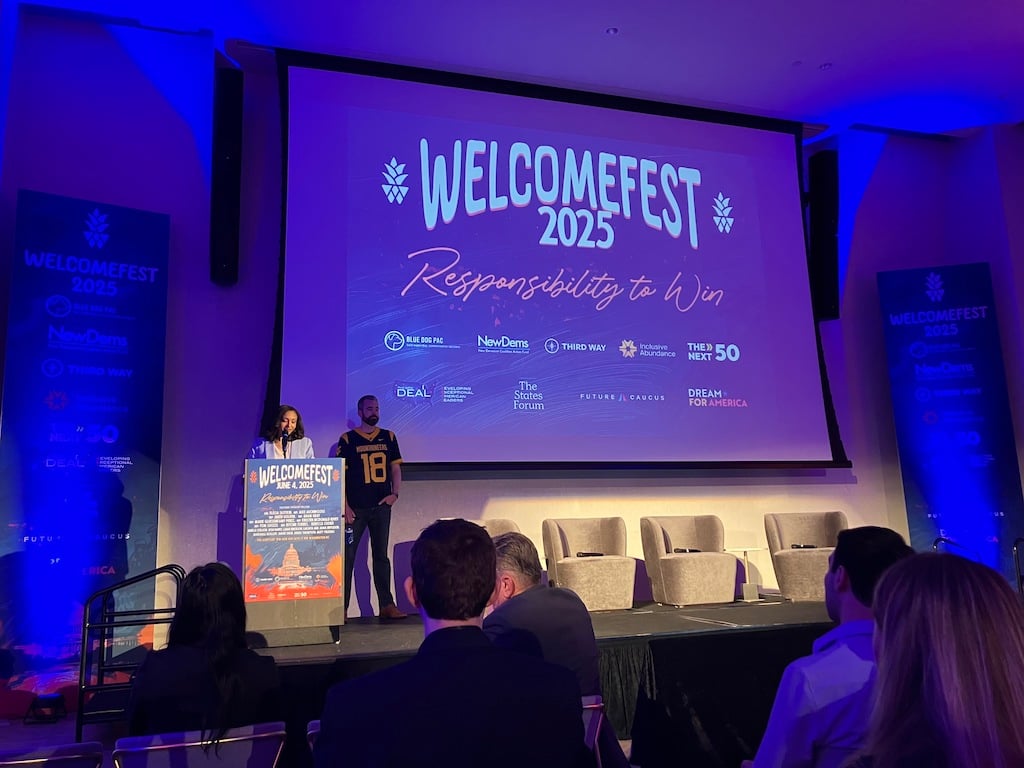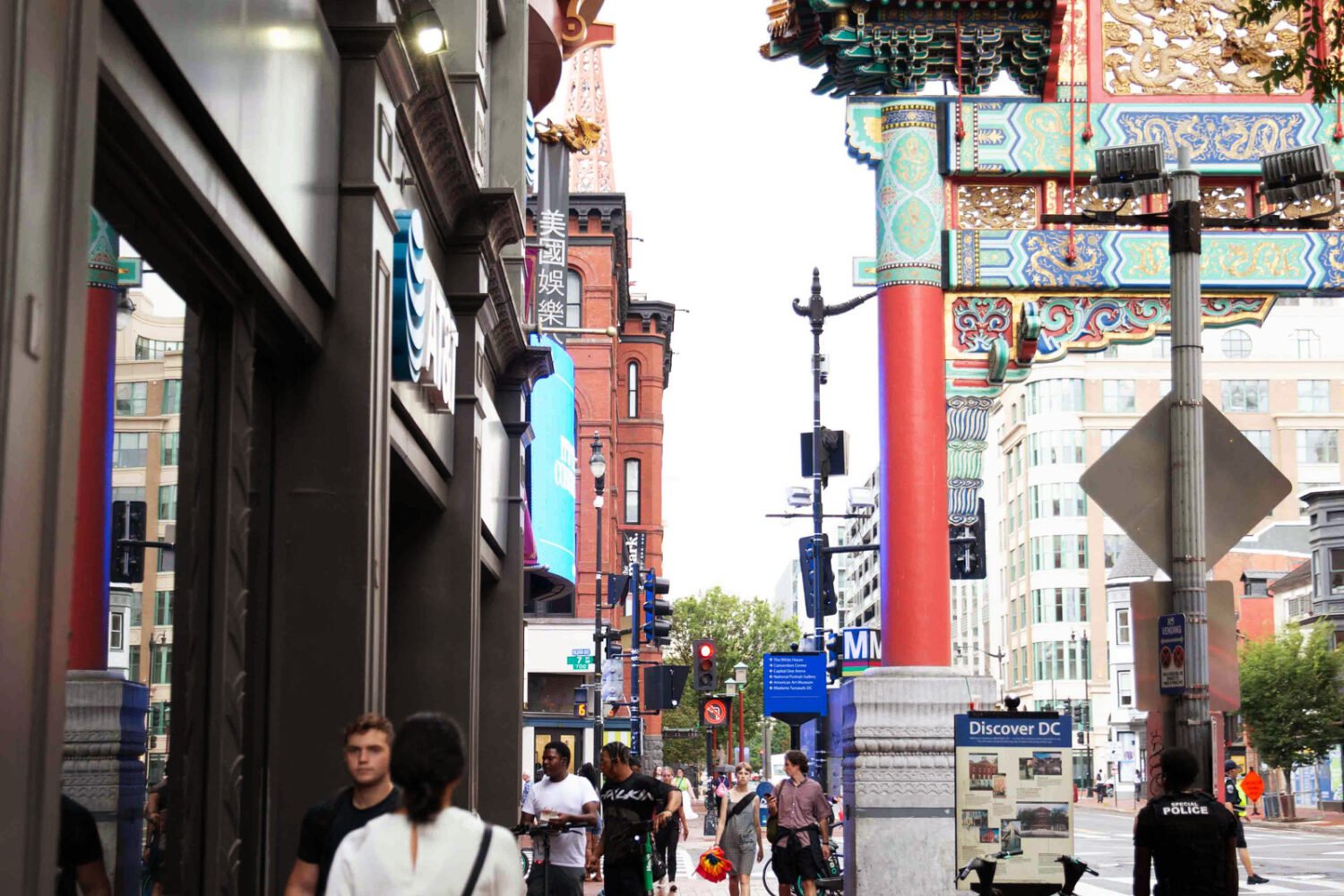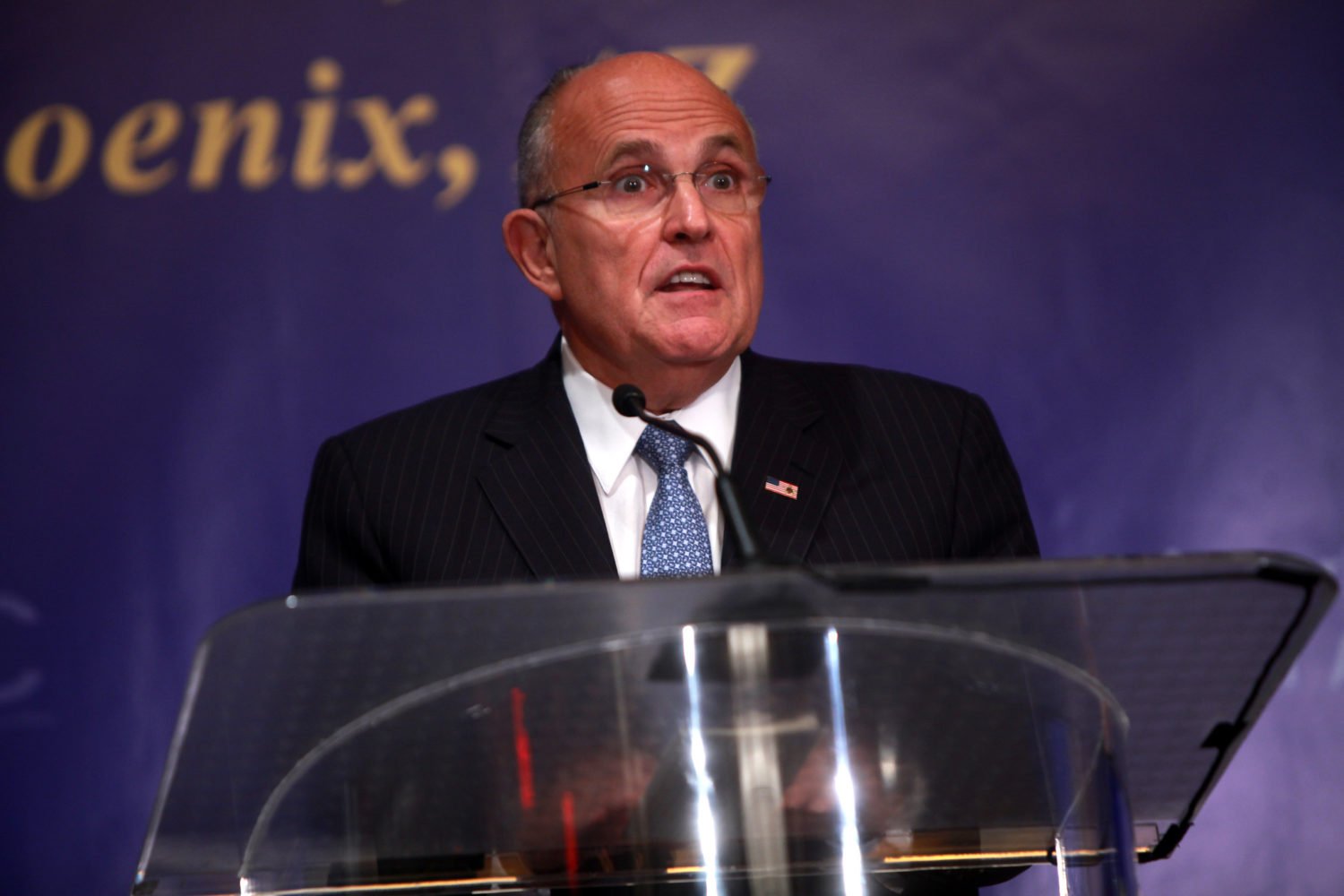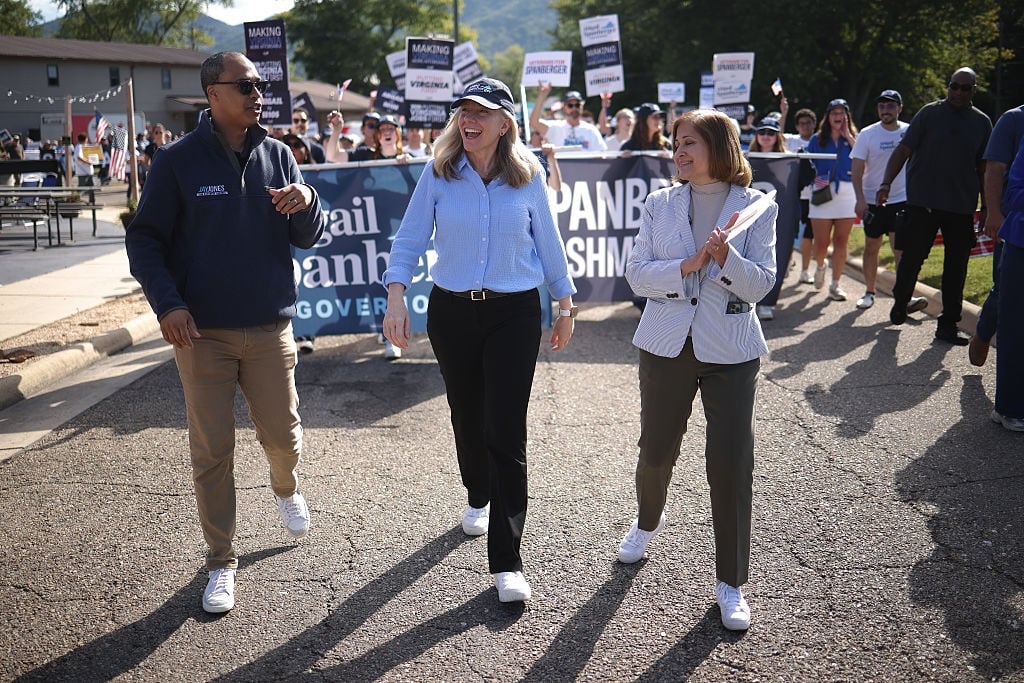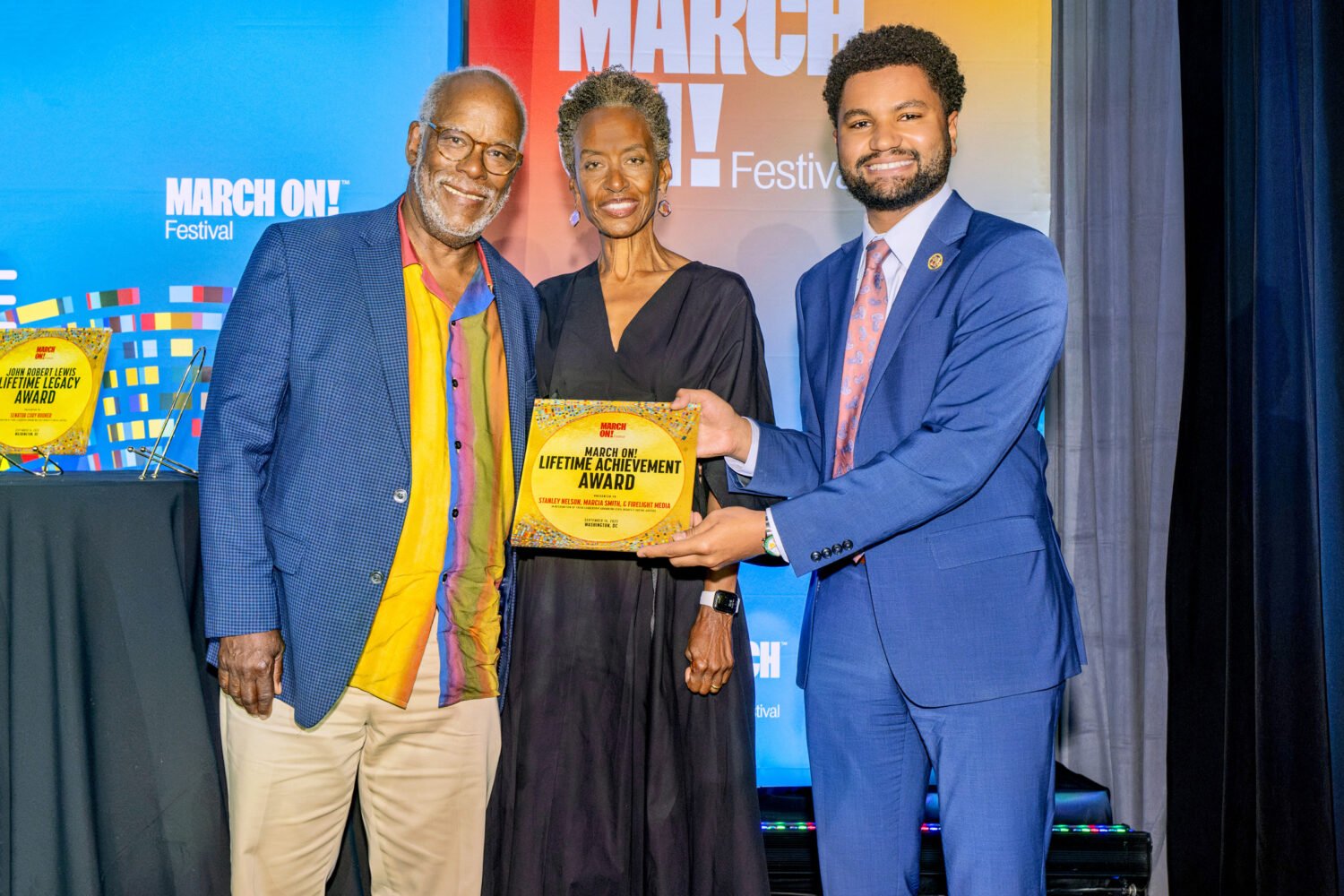When I told a friend that I’d just been to WelcomeFest—billed as the “largest public gathering” of the center-left—she asked if Democrats know how much everyone hates them. The answer is yes. They know. And they’re talking about it at length.
“We really are lucky that we only lost by a point,” the pollster David Shor chirped to a ballroom of 500 groomed, lanyarded professionals who had assembled in the basement of DC’s Hamilton Hotel: consultants, campaign staffers, candidates, activists, plus a handful of leftist looky-loos who’d come for the lulz. The room was exceptionally white, mostly male—cubicle types clutching tote bags from Dream for America (a left-ish Turning Point USA) filled with notebooks from Third Way (the banking-cozy think tank) and stickers with slogans like “I got elected to get shit done.” There was earnest talk of preserving democracy and how bad it feels to get yelled at online. To their credit, there wasn’t a lot of denial. These centrists wanted to stare into the sun.
Between 2020 and 2024, Shor said, Democrats went from being popular to unpopular, and “the most straightforward explanation is that voters saw the Biden administration as a failed presidency.” Biden, he claimed, ended his term less popular than Trump was immediately after January 6th. This caused a stir in the room. “Say that again,” shouted someone in the back.
In Shor’s diagnosis, Democrats have two related problems. One is that Americans see the party as too ideologically extreme. (Various polls showed that voters found Donald Trump substantially more moderate than Kamala Harris, and believe the Democratic party has moved further left than the Republicans have moved right.) Two, there’s a trust deficit on the issues that count. Shor threw up a chart—which he said “basically tells the story of this election”—illustrating that on the majority of voters’ top issues (cost of living, immigration, taxes), Republicans had substantially more trust. “It’s really only singularly because Donald Trump is such an unlikeable person that we didn’t lose by 10 or 15 percentage points,” Shor said.
Indisputably, the Democratic brand is toxic. In March, a CNN poll placed the party’s overall favorability at a miserable 29 percent, the lowest in that outlet’s polling history. (Even among those who lean left, the Democrats’ favorability—81 percent when Biden took office—plunged to a tepid 63 percent this year.) The coalition is shedding immigrants, young people, nonwhite voters, moderates, and men. And now, cast fully from power, Democrats are feuding. New York magazine called it “The Battle for the Democratic Future,” the Atlantic “The Coming Democratic Civil War.”
On one side is the populist left, the Bernie types who want to bash billionaires and curb corporate power. On the other is the center-left, the folks who think only moderates have the relatability and pragmatism to win. Centrists have long been dogged by the perception that they stand for nothing, that they merely triangulate a position exactly halfway between the extremes while siphoning oodles of corporate cash. But I came to WelcomeFest because voters see mainstream Democrats as partisan lunatics who want to replicate the worst parts of San Francisco in Iowa. Given that, I figured moderates might have something valuable to say.
To open the day, Liam Kerr—one of the conference’s organizers—stood before the room in a blue and yellow West Virginia University football jersey, the name “Manchin” printed on the back. In his hand was a beer, which he flashed to the crowd. Its koozie (navy blue, outlined with the state of Maine) was campaign swag from Congressman Jared Golden, a “progressive conservative” who’s one of the Democrats’ least-reliable votes. “We need five more Jared Goldens, we need five more Joe Manchins,” Kerr thundered to the room. He meant that, had five more Democrats won House seats last fall, Trump’s legislative agenda—at least the more extreme parts—would be dead.
The theme of this second annual WelcomeFest was “responsibility to win.” That’s the notion that electoral victory is morally imperative for Democrats, because everything important (protecting democracy, delivering good policy) lies downstream from that. “If you want to fight fascism, go win elections,” is how data wonk Lakshya Jain put it in the first talk of the day.
Many of the centrists’ ideas were technocratic. Jain explained how he’d taken a baseball metric—wins above replacement—and applied it to politics as a way to “expand the battleground with data.” Various moderates spoke with naked envy of the robust political infrastructure (PACs, advocacy organizations, media outlets) that the progressive movement has built in recent years. Centrists want to replicate those gains. Perhaps that’s why so much at WelcomeFest (the CPAC of the center-left) felt like the generic brand of something else.
The great boogeyman of WelcomeFest was “the groups.” That’s liberal and progressive interest groups, like Indivisible and the Sunrise Movement, who are credited with foisting unpopular issue positions on candidates and elected officials, such as using the term “Latinx” or defunding the police. Centrists believe that the groups have created an onerous menu of litmus tests—backed by carrots (money, endorsements, organizing power) and sticks (bad press for apostates, mockery online)—that have pushed mainstream Democrats into positions that don’t work for their districts, tarnishing the party’s brand and contributing to the perception that Democrats are extreme.
The centrists also heaped scorn on consultants, Beltway types who parachute into the heartland and dispense expensive, wrongheaded advice. Candidate after candidate hopped onstage and described overperforming in swing districts after defying the best counsel of campaign professionals. Tom Suozzi, who won the Long Island seat vacated by George Santos, said he ran on immigration despite consultants telling him it was a “Republican issue.” Golden said consultants didn’t believe that his constituents cared about the national debt. Adam Gray won his heavily agricultural district in California by talking a lot about water, despite out-of-town advisors insisting it was “not important and nobody cares.”
“The things I get really excited about are often so locally focused that they’d make your eyes glaze over,” said Golden, who represents the most pro-Trump district of any Democrat in the House. The four-term Congressman is a solid and bracing example of the kind of candidate centrists hope to recruit. Golden often votes with his party—but he tolerates Trump, supports tariffs, rejected Build Back Better, and only came around to banning assault weapons in the wake of the 2023 massacre in his hometown of Lewiston, Maine. “A lot of you may say that you find some of Jared Golden’s votes annoying for a Democrat,” Jain said. But the path to a House majority—which enables a party to bring bills to the floor, set committee agendas, hold hearings, and pursue investigations—runs through districts like his.
To leftists, embracing conservative Democrats sells out their values and enables Pyrrhic victories at best. They believe officials like Golden are why voters don’t trust the party: because Democrats don’t stand for anything clear. But actually, evidence points the other way. Swing voters like candidates who aren’t in lockstep with their party—ones who lean left on some issues and right on others—because that’s what they’re like themselves. “People are profoundly heterodox,” said Congresswoman Marie Gluesenkamp Perez during a panel. “Like, if you actually talk to normal people, the same person who has pretty left views on trans rights will also be very fiercely Second Amendment.” The moderates of WelcomeFest weren’t looking to remake the party in their image, to force Democrats to be uniformly center-left. Speaker after speaker stressed that they had no desire quash the Squad—they simply wanted a bigger ideological tent.
The MAGA right has a clear story to tell: that they’ll restore power and esteem to normal people by mercilessly targeting elites. The populist left has a story, too: that billionaires and big corporations are hoarding cash and rigging the game. “I don’t think the center-left has a story in the same way,” said Marshall Kosloff, host of the Realignment podcast, during a panel with Congressman Jake Auchincloss and journalist Derek Thompson. “So I’d love to hear from the two of you, what story would you tell?”
In a way, Kosloff was asking the big question: What do centrists stand for? What is their “forward vision,” as the conference organizers suggested they’d discuss? Auchincloss said he didn’t know, and that’s okay; in upcoming elections, “voters will tell us what resonates and what doesn’t.” His bleak implication was that the best story to tell is whatever the electorate seems to want to hear.
Thompson, I thought, would do better. He and Ezra Klein are the co-authors of the recent book Abundance, which has become something of a policy manifesto for the center-left. Embraced by top Democrats like Wes Moore, Pete Buttigieg, and Josh Shapiro, the abundance agenda takes the premise that government is no longer delivering to Americans what they need, including housing, green infrastructure, and cures for disease. To fix this, abundance folks want the state to act like it did during Operation Warp Speed, the Trump administration’s race for a Covid vaccine: relax onerous regulatory processes, lean into public-private partnerships, and focus on results.
A perk of the abundance agenda is that it could provide the center-left with a vision, a program to take to voters that isn’t just “see how often I’ve reached across the aisle,” but “here is what we will build.” Asked what story he would tell, Thompson might have said something like this: A better future doesn’t just mean redistributing all the things we already have, but also creating things that don’t yet exist. Democrats will give you housing and healthcare and solar panels and jobs. Instead, he replied that “stories are for children.” He said politicians have fallen too in love with the idea that “you don’t have an agenda until you have a story,” that they’ve come to believe policy should flow from campaign messaging, not the other way around.
That hostility to storytelling, I think, is how you get that much-discussed poll from the progressive group Demand Progress, in which voters were asked if the “big problem” in America is that “big corporations have way too much power over our economy and our government” (the populist argument) or that “‘bottlenecks’ make it harder to produce housing, expand energy production, or build new roads and bridges” (a bizarrely technocratic articulation of abundance). Nobody would be shocked to learn that “big corporations” outperformed “bottlenecks” as a storybook villain. It was, as Thompson suggested, a manipulative survey, message testing poetry against prose. But stories matter. That kind of manipulation works. The center-left won’t win if it can’t play the game.
The best-faith critiques of abundance are that it’s bizarre to tell a story of scarcity that blames government regulations, not corporate profiteering and right-wing governance, for all the things that Americans lack. That deregulating housing and infrastructure construction would leave poor communities vulnerable to predation, that techno-optimism never pans out. The left says abundance is a Trojan horse for corporate interests, a business-friendly narrative meant to lure big money to the center by letting it off the hook for its crimes.
I met one such critic at WelcomeFest: a man in a white “Glory to Palestine” shirt, who stood out from the besuited throng during the clamorous happy hour in the claustrophobic basement lobby. Apparently, this man—who works in communications for a pro-Palestinian organization and didn’t want me to print his name—crashed the happy hour because he thought it would be “super funny.” He told me that moderates “think they know how to win elections, but they don’t,” and that “the agenda here is driven by billionaires, and people who live like that don’t relate to normal people”—and that if Democrats run on abundance, they’ll lose.
Instead, he wants Democrats to tell voters that they’re fighting corporations and bringing down prices, that “we’re not going to fund [the Palestinian] genocide, and we’re going to support human rights for immigrants, for queer people, for women.” He thinks regular voters actually like that agenda—but that “weird billionaires throw a lot of money around” to make those beliefs seem bad. This guy was working the narrative; there were heroes (leftist Democrats) and villains (weird billionaires) and innocent identity groups to save.
For a while, I circled the room seeking some kind of centrist equivalent, any conversation that felt energizing and clear. But I met consultants, and former consultants, and future consultants who are currently campaign staffers, and a man who said that at least WelcomeFest was “more cathartic than doomscrolling,” and a man who was “just excited about the future of the party,” and a man who gives ghost tours but wants to work in policy and so far had 13 networking emails to send.
Before I left, I tracked down Kerr—the conference co-organizer with the Manchin jersey—who was sipping a Bud Lite by the elevator bank, giving an interview to a somber looking reporter from the Epoch Times. When he was done, I pointed to Kerr’s jersey and asked what he’d say to voters who are mad that Manchin killed Build Back Better, the Biden administration’s sweeping plan to fortify the nation’s social safety net, fight climate change, and build infrastructure on a scale not seen since FDR. His answer shocked me in its pedestrianism: that Manchin may have been right. At the time, the Senator was worried about inflation, and inflation probably cost Democrats the White House. “He was a bit of sanity, I guess,” Kerr said.
A couple minutes later, as I emerged from that basement into the blistering evening, I felt stultified and hungry and sad. All day, the centrists were uninspiring: boring and bloodless, rational and calm. They were deep in the data, uninterested in narrative, unwilling to put on a show. It made me wonder: Would anyone even listen if they’re right?

